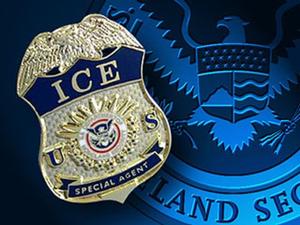Border securityDHS helps New Mexico battle local gangs and cartels
In recent years, DHS has sent more and more federal agents and resources to New Mexico to help local law enforcement officials battle gangs, catch drug dealers, and other criminals; since 2009 DHS has deployed more than sixty agents to New Mexico and formed several joint task forces and multiagency groups

DHS gets involved in gang and cartel battles // Source: borderlandbeat.com
In recent years, DHS has sent more and more federal agents and resources to New Mexico to help local law enforcement officials battle gangs, catch drug dealers, and other criminals.
Since 2009 DHS has deployed more than sixty agents to New Mexico and formed several joint task forces and multiagency groups designed to take down rural gangs, political corruption, drug traffickers, gun runners, child pornography rings, and human smugglers.
The additional DHS presence comes as part of a new strategy that recognizes the challenges New Mexican law enforcement agencies face.
According to U.S. Attorney General Kenneth J. Gonzales, New Mexico has long been ignored with federal officials focusing much of their attention on more high profile areas around the country. But, in recent years officials have recognized that criminals exploit the state’s 180-mile border with Mexico and large, rural Native American reservations to smuggle guns and drugs across the border.
So far federal help has led to several high-profile drug busts.
In May local law enforcement officials in Roswell, New Mexico with the help of undercover federal agents arrested more than eighty-four members of a rural gang that had been smuggling drugs.
Meanwhile in March in the border town of Columbus, New Mexico, federal investigators busted a drug and firearms smuggling ring that included the town’s mayor and police chief, who both pleaded guilty to federal charges.
For the most part, local officials have welcomed federal assistance.
“The feds don’t mess around,” said Roswell Police Chief Al Solis. “When they come in, they bring the resources.”
Governor Susana Martinez echoed Solis’ sentiments, stating, “We are certainly in a very unique position because we are a border state so any and all assistance to enforce the law is extremely important to us.”
“It’s very challenging in rural areas,” Martinez added.
“We loved that the feds have come down here and are able to get these federal indictments,” said Ron Coon, the Sheriff of Chaves County which includes Roswell. “It’s not that our DA is not effective. But the office is hampered by state law, which isn’t as strong.”
As a result of the deep-seeded gang violence in the area, Chaves County is home to roughly two and a half times the number of firearm injuries as the rest of the state.
Coon said federal law enforcement agents came to the county’s aid after he and Solis requested assistance in dealing with “Crazy Town Roswell,” a local prison gang that was responsible for many of the burglaries and crimes in the town.
Unlike local law enforcement officials, civil rights advocates are leery of the presence of federal resources and investigators.
Peter Simonson, the executive director of the New Mexico chapter of the American Civil Liberties Union, said the group was concerned that the additional presence of federal agents could result in state and local police shifting their focus to the enforcement of federal immigration laws and to employ questionable tactics.
“In executing drug raids, we have recently seen joint police efforts employ overly aggressive tactics to apprehend relatively low risk targets,” Simonson said. “We are also concerned by increased civil liberties violations along the border that appear to be the result of flooding that region with an excess of agents and other resources.”
